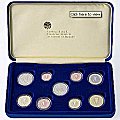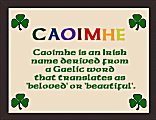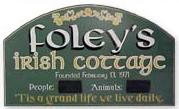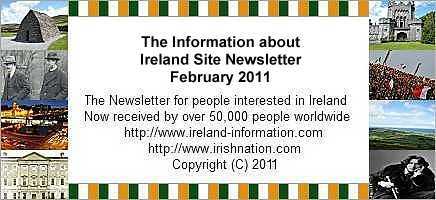
===========
IN THIS ISSUE
===========
=== News Snaps from Ireland
=== New free resources at the site
=== Eamon DeValera: Third President of Ireland
=== Peculiarly Irish Words and Phrases #4: Safe Home
=== The Life of Saint Patrick
=== Getting Connected by John B. McCabe
=== Gaelic Phrases of the Month
=== Monthly free competition result
==========
FOREWORD
==========
The dust is beginning to settle on General
Election 2011 with, as expected, Fine Gael
seizing power from their arch-rivals Fianna
Fail. The promise of big change in Ireland has
been rewarded by an electorate reeling from
massive spending cuts, increased taxes, high
unemployment and emigration.
The bank bailout agreement with the IMF is the
very first item on the agenda with interesting
negotiations ahead.
Michael
KEEP THIS NEWSLETTER ALIVE!

Get Your Family Crest Shield at:
https://www.irishnation.com
WE NEED YOUR HELP!
PLEASE - send this newsletter on to your friends
or relatives who you think are interested in
Ireland. By doing this you are helping to keep
us 'free'.
Got something to say? Don't keep it to yourself!
Why don't you submit an article for inclusion
in the next edition? Go here for more information:
https://www.ireland-information.com/newsletter.htm
Do you have access to a website? You can help to
keep this newsletter alive by adding a link to
any of our websites below:
https://www.irishnation.com
http://www.irishsurnames.com
https://www.ireland-information.com
http://www.allfamilycrests.com
http://www.irishpenpals.com
If you have an AOL or HOTMAIL account then you
may get better results by viewing this
newsletter online here:
https://www.ireland-information.com/feb11.htm
The only way that you could have been
subscribed to this newsletter is by filling
out a subscription form at the site whereupon
a confirmation notice would have been issued.
If you wish to unsubscribe then go here:
https://www.ireland-information.com/newsletter.htm
========================
NEWS SNAPS FROM IRELAND
========================
BIG ELECTION VICTORY FOR FINE GAEL
Fine Gael have emerged triumphant in the General
Election which has seen Fianna Fail decimated and
the Green Party obliterated. Enda Kenny is certain
to be the next Taoiseach and it only remains to be
seen if his Fine Gael Party attempts to govern with
the assistance of independents or in full coalition
with the Labour Party.
Fine Gael: the traditional opponents of Fianna Fail
(pronounced finnah gale)
Fianna Fail: the recently deposed largest party
(pronounced feena fawl)
Taoiseach: the leader, Irish Prime minister
(pronounced tee-shock)
Sinn Fein: political party led by Gerry Adams
(pronounced shin fain)
T.D.: an elected member of the Irish parliament
Dail Eireann: The Irish parliament of 166 T.D.s
(pronounced dawl air-inn)
Tanaiste : the deputy Prime Minister
(pronounced tawn-ishte)
Arguably the most momentous election in the history
of the Irish state has seen the Irish political
landscape utterly transformed. Fine Gael and
Labour have dramatically increased their vote
while Fianna Fail and the Green Party have
suffered greatly.
A comparison of the 2007 election result and
the 2011 result shows just how much things have
changed in Ireland in the last 4 years:
Fianna Fail: 20 seats won, down from 77
Fine Gael: 76 seats won, up from 51
Labour: 37 seats won, up from 20
Sinn Fein: 14 seats won, up from 4
Green Party: 0 seats won, down from 6
Independents: 15 seats won, up from 5

FINE GAEL: An absolute triumph for Fine Gael has
been tempered only by their failure to get an
overall majority. With 166 seats in the Dail they
need 83 to govern alone but fell short by 7. Their
vote management has been praised on this occasion,
unlike in 2007 and 2002 when it was Fianna Fail
who looked the more professionally run
organisation. As the election campaign progressed
their core support actually increased as the
expected surge of support for the Labour Party
never materialised.
Party leader Enda Kenny has only recently managed
to quell a revolt within his own Party and face
down a challenge to his leadership from Richard
Bruton. He won that battle and has eventually won
the war. In the end the electorate did not really
seem to care too much about his personal style,
what they wanted was a big change of government
and Fine Gael were the obvious choice.
There will be no honeymoon for Fine Gael. They
have repeatedly insisted that elements of the
recent bank bailout with the IMF must be changed
and are due to meet European leaders in the
coming weeks. With unemployment stubbornly near
14% the Irish economy is going to take years to
turn around. The history of bank bailouts and
property crashes in other countries can inform
that the best solution is immediate cuts while
keeping taxes low. Get the pain over with and
start to recover. Economies that have tried to
tax and spend their way out of trouble have
often lost a decade or more so the impetus is
very much on Fine Gael to impose its policies
fast.

LABOUR PARTY: A gain of 17 seats (up to 37
from 20) would under any other circumstances be a
remarkable triumph for a Party like Labour and
while they have beaten Fianna Fail into second
place the Party faithful must be at least a
little bit concerned. With all of the economic
and political winds behind them they have
failed to make the massive breakthrough they so
deeply craved. It can certainly be argued that
the more left wing parties such as Sinn Fein,
the Socialist Party, the 'People Before Profits'
Party and the various other independents took
seats away from Labour but the question has to
be asked why they did not scoop at least 50
seats to become the firmly established second
Party in the country. If they could not achieve
this with the electoral climate the way it is
at the moment then it is unlikely they will ever
be able to do so. Perhaps the Party began to
believe the opinion polls that showed Labour
riding high or perhaps the electorate merely
flirted with Labour, liking the idea rather than
the reality. The 'Gilmore for Taoiseach' posters
are now looking very foolish indeed.
It is likely that Labour will enter into coalition
with Fine Gael with Eamon Gilmore as Tanaiste but
it is unclear just how these two Parties will be
able to compromise their core values. Fine Gael
want to massively reduce the size of the public
service for example, Labour does not. Fine Gael
wants to get the financial pain over with
quickly, Labour wants to extend the spending
cuts and tax increases over a longer timespan.
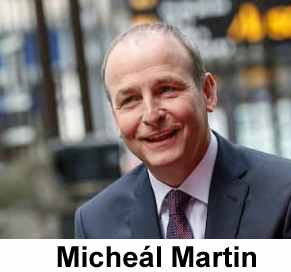
FIANNA FAIL: This election has been an utter
disaster for Fianna Fail. Party leader Michael
Martin assumed the reins of power only a matter
of weeks ago and can perhaps be credited with
preventing the Party losses from being even
greater. He performed pretty well in the TV
debates but his association with the ruling
government and particularly that governments
handling of the bank bailouts left him and his
Party in an untenable position. His leadership
must be brought into some question though,
particularly in the matter of vote management.
In several constituencies Fianna Fail ran two
candidates when it was patently clear from
polling that they would barely be able to elect
one. In Dun Laoghaire Barry Andrews' decision to
effectively run against his party colleague
Mary Hanafin cost her and the Party dearly.
The deputy leader of Fianna Fail was narrowly
beaten by a left-wing candidate with Barry
Andrews costing her her seat. The same can be
said in the Dublin Central constituency where
Cyprian Brady split the Fianna Fail vote and
cost Mary Fitzpatrick her seat, with Sinn
Fein this time being the beneficiary. Neither
Andrews nor Brady had any hope of being elected
yet the continuation of their campaigns cost
Fianna Fail two seats. This was a scene replicated
in other constituencies around the country and
begs the question why Michael Martin did not
intervene and instruct the lowest-polling
candidate to stand down. This never happened
and it cost Fianna Fail seat after seat.
Fianna Fail must now try to rebuild in the same
way that Fine Gael had to rebuild after 2002
when they had just 31 seats. Fine Gael are
already trumpeting this election victory as a
two-term mandate. A lot can happen in the maximum
five years term of office though and even though the
tide is very much against Fianna Fail now the Party
is well enough organised to make a comeback.

SINN FEIN: The Party of Gerry Adams has had a
big breakthrough. With Fianna Fail losing seats
everywhere this was a golden opportunity for Sinn
Fein to establish themselves as a real force of
opposition in Dail Eireann and they have done just
that. Despite attempts to continually link the
party to its IRA past the performance of Gerry
Adams in the TV debates in particular has
certainly struck a chord with the Irish electorate.
Their policies are often regarded as radical and
perhaps the detail of some of their financial
proposals are sketchy but it is the enthusiasm
of their opposition to the bank bailout that has
jettisoned them to a position of real prominence
in the Irish Parliament.
GREEN PARTY: Wiped out. Zero seats and death by
association with Fianna Fail. Historically, smaller
coalition Parties have usually suffered badly when
the outgoing government has been punished. Their
failure to get even one seat shows just how much
the economy was centre-stage in this election.
Perhaps unfairly environmental issues always take
a back seat at a time of recession. With the
larger Parties now all taking environmental issues
on board to some extent perhaps the very purpose
of the Green Party has been achieved. It is hard
to see any way back for the Party from here and
although they have some good people within their
organisation it seems unlikely they will be able
to survive.
INDEPENDENTS AND SMALLER PARTIES: Given
the excessive influence that independent T.D.'s had
over the outgoing government it is perhaps no
surprise that many more independents have been
elected. Most are left-wing in nature and perhaps
took votes away from the Labour Party. The phrase
coined by the former U.S. 'Speaker of the House'
Tip O'Neill that 'all politics is local' has never
seemed more relevant. Short-sighted perhaps but
understandable to a degree given the disparity of
suffering across the country with unemployment and
emigration rampant.
OVERVIEW: The rise of the left in Ireland has
been matched only by the absence of any sign of a
right-wing party. Fine Gael and Fianna Fail have
long been regarded as being right of centre but
the end of the Progressive Democrats has left a
void that is sure to filled once the inevitable
excesses of left wing influence start to be
exerted. It is very likely that a new Political
Party will be formed, perhaps with the remnants
of the Greens, the P.D.'s and various independents.
Financially the country is a mess and the single
biggest issue of this general election seems to
have been the bank bailout. The effective
nationalisation of private bank debt has been
deemed unforgivable and unnecessary by the Irish
people and will now to some extent at least be
reversed. The failure of the Bertie Ahearn Fianna
Fail governments to regulate the banks while
encouraging the property boom, combined with the
subsequent bank bailout is the reason why Fianna
Fail were caned. They got it wrong. If Fine Gael
can turn this situation around in the next few
years then they could easily win a second term.
If the pain drags on until the next election then
the Irish electorate, as fickle as anywhere else,
may just start looking for a new saviour.
Can a recovery be effected in the short term or
will long-term pain, unemployment and emigration
blight another Irish generation.
This is a critical moment in the history of Ireland.
Voice your opinion on these news issues here:
https://www.ireland-information.com/newsletterboard/wwwboard.html
=============================
NEW FREE RESOURCES AT THE SITE
=============================
IRISH HOLIDAY AND TOURIST FORUM
Post your question about holidaying in Ireland and
we guarantee an answer will be posted on the board:
https://www.ireland-information.com/irishholidays-irishtourist/irishtouristboard.html

NEW COATS OF ARMS ADDED TO THE GALLERY
The following 5 coats of arms images and family
history details have been added to the Gallery:
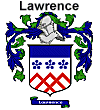
A: Ashe
K: McKee, Kellett
L: Lawrence
W: Wilde
View the Gallery here:
http://www.irishsurnames.com/coatsofarms/gm.htm
THE PERFECT WEDDING, ANNIVERSARY OR BIRTHDAY GIFT!
We now have over 100,000 worldwide names available.
Get the Coat of Arms Print, Claddagh Ring,
Screensaver, Watch, T-Shirt Transfer or Clock for
your name at:
https://www.irishnation.com/familycrestgifts.htm
YOU CAN HELP TO KEEP THIS FREE NEWSLETTER ALIVE!
Visit: https://www.irishnation.com
where you can get great Irish gifts, prints,
claddagh jewellery, engraved glassware and
much more.
Anne MacDonald of Massachusetts, USA ordered
a family crest plaque:
Hello, Michael,
Received my plaque, carefully wrapped,
in good order. It is splendid! I am
thrilled, and I know that my dad, for whose
81st birthday this was ordered, will love
it. I would like to order another one!
Everyone who has seen the plaque has been
really impressed, even those who, as my
daughter says are 'not into ancestor
worship!'Again, my hearty thanks for this
first-class product.
Sincerely, Anne MacDonald

THE PERFECT WEDDING OR ANNIVERSARY GIFT!
View family crest plaques and shields here:
https://www.irishnation.com/familycrestplaques.htm
===========================================
EAMON DEVALERA: SECOND PRESIDENT OF IRELAND
===========================================
'All history is man's efforts to realise ideals.'
Eamon DeValera, 1929
The political history of Ireland in the early
part of the twentieth century is dominated
by a number of characters and events, Padraig
Pearse and the 1916 Rising, Michael Collins and
the War of Independence and subsequent Civil War.
No single person had more eventual influence over
Irish life than Eamon DeValera. He fought in
1916, was a leader of the first Irish Dail in
1919, opposed the Anglo-Irish Treaty, fought
Michael Collins in a bloody Civil War, founded
Fianna Fail in 1926 and led that party to power
in 1932. He drafted the new Irish Constitution in
1937 and maintained Irish neutrality during World
War 2. He fought against the partition of Northern
Ireland after new Taoiseach John A. Costello had
declared Ireland a Republic in 1948. His Fianna
Fail Party spent much of the next two decades in
power with DeValera as Taoiseach. It was in 1959
that he resigned to become the third President of
Ireland.
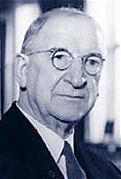
DeValera handed over the reigns of power to Sean
Lemass who was seen as a much more progressive
Taoiseach, especially in economic matters. DeValera
was by this time regarded as old-fashioned and out
of touch and at the age of 75 his social policies
and staunch Catholicism were often regarded as holding
back the country from real progress. He was first
elected President in 1959 and re-elected in 1966,
aged 84 years. Given the often ceremonial role that
the Irish Presidency consists of his tenure as
President was far less dramatic than his previous
political career. He oversaw the famous visit of
US President John F. Kennedy. He was the first Irish
leader to address the US Congress in 1964. In 1969 the
fiftieth anniversary of the founding of Dail Eireann
was marked by his address to both houses of the Irish
Parliament. In 1969 the US attempt to land on the
moon captivated the world. 73 countries sent NASA
messages of support which were included with the
Lunar mission and remain on the surface of the moon
to this day. The message DeValera offered was:
'May God grant that the skill and courage which
have enabled man to alight upon the Moon will
enable him, also, to secure peace and happiness
upon the Earth and avoid the danger of
self-destruction'.
He retired in 1973 aged 90 years which continues
to be a world record for any head of state. His
legacy as one of the founders of the modern Irish
State is assured but his overall influence in
shaping Ireland has been subject to much criticism.
In modern times historical revisionists have
concluded that his conservatism and alliance with
the Catholic Church severely held back the
development of the country. In economic terms the
real progress of the country only began to take
off once he had left office and the inspired
policies of Sean Lemass were enacted. He has
been roundly blamed for causing the Civil War as
a result of rejecting the will of the Irish people
who voted in favour of the acceptance of the
Anglo-Irish Treaty.
As President he represented an era when the
Irish state was in a period of transition. The
country was desperate for economic and social
change. Ireland in the 50s, 60s and 70s was still
a time of emigration and it was not until the 80s
and 90s that real social and economic progress
began to take place. The fact that it took seven
decades to realise this progress is an indictment
of DeValera's political career but also a
recognition of the character of the Irish people
at this time. There were no mass protests, no
attempts to overturn the governing elite.
His greatest achievement therefore is surely his
part in achieving the independence of the country
from England. As he is quoted as saying:
'No matter what the future may hold
for the Irish nation, the seven years
— 1916 to 1923 — must ever remain a
period of absorbing interest. Not for
over two hundred years has there been
such a period of intense and sustained
effort to regain the national sovereignty
and independence. Over the greater part
of the period it was the effort of,
one might say, the entire nation.
An overwhelming majority of the people of
this island combined voluntarily during
those years in pursuit of a common purpose.'
KEEP THIS NEWSLETTER ALIVE!

Get Your Family Crest Signet Ring at:
https://www.irishnation.com
PECULIARLY IRISH WORDS AND PHRASES #4: SAFE HOME
There are of course many ways of bidding farewell
other than the standard 'goodbye'. Irish people can
be heard to say 'all the best', 'be seeing you',
'take it handy' or 'good luck'. Perhaps one of
the most elegant means of departure is to say
'safe home', meaning 'be safe on your way to your
home', offered as a gesture of care and a wish for
good fortune rather than as a description of any
ultimate destination!
THE LIFE OF SAINT PATRICK
The Patron Saint of Ireland was born into Roman
Britain in the fourth century. He was captured as
a teenager by Niall of the Nine Hostages who was
to become a King of all Ireland.
He was sold into slavery in Ireland and put to
work as a shepherd. He worked in terrible
conditions for six years drawing comfort in the
Christian faith that so many of his people had
abandoned under Roman rule.
Patrick had a dream that encouraged him to flee
his captivity and to head South where a ship was
to be waiting for him. He traveled over 200
miles from his Northern captivity to Wexford
town where, sure enough, a ship was waiting to
enable his escape.
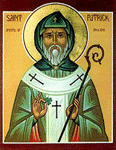
Upon arrival in England he was captured by
brigands and returned to slavery. He escaped
after two months and spent the next seven years
traveling Europe seeking his destiny.
During this time he furthered his education and
studied Christianity in the Lerin Monastery in
France. He returned to England as a priest.
Again a dream greatly influenced him when he
became convinced that the Irish people were
calling out to him to return to the land of
his servitude.
He went to the Monastery in Auxerre where it
was decided that a mission should be sent to
Ireland. Patrick was not selected for this task
to his great disappointment. The monk that was
selected was called Paladius, but he died before
he could reach Ireland and a second mission was
decided upon.
Patrick was made a Bishop by Pope Celestine in
the year 432 and, together with a small band of
followers, he traveled to Ireland to commence
the conversion.
Patrick confronted the most powerful man in
Ireland, Laoghaire, The High King of Tara, as
he knew that if he could gain his support then
he would be safe to spread the word throughout
Ireland. To get his attention Patrick and his
followers lit a huge fire to mark the commencement
of Spring. Tradition had it that no fire was to
be lit until the King's fire was complete, but
Patrick defied this rule and courted the
confrontation with the King.
The King rushed into action and traveled with the
intention of making war on the holy delegation.
Patrick calmed the King and with quiet composure
impressed upon him that he had no intention other
than that of spreading the word of the Gospel.
The King accepted the missionary, much to the
dismay of the Druids who feared for their own
power and position in the face of this new threat.
They commanded that he make snow fall. Patrick
declined to do so stating that this was God's
work. Immediately it began to snow, only stopping
when Patrick blessed himself.
Still trying to convince the King of his religion
Patrick grasped at some Shamrock growing on the
ground. He explained that there was but one stem
on the plant, but three branches of the leaf,
representing the Blessed Trinity. The King was
impressed with his sincerity and granted him
permission to spread the word of his faith,
although he did not convert to Christianity
himself.
Patrick and his followers were free to spread
their faith throughout Ireland and did so to great
effect. He drove paganism (symbolised by the
snake) from the lands of Eireann.
Patrick was tempted by the Devil whilst on a
pilgrimage at Croagh Patrick. For his refusal to
be tempted, God rewarded him with a wish. Patrick
asked that the Irish be spared the horror of
Judgment Day and that he himself be allowed to
judge his flock. Thus, the legend that Ireland
will disappear under a sea of water seven years
before the final judgment, was born.
Patrick died on March 17th in the year 461 at the
age of 76. It is not known for sure where his
remains were laid although Downpatrick in County
Down in the North of Ireland is thought to be
his final resting place.
His influence is still felt to this day as Nations
the world over commemorate him on March 17th of
every year.
===
Saint Patrick screensavers, pictures to color and
more can be found here:
https://www.ireland-information.com/saintpatricksday.htm
KEEP THIS NEWSLETTER ALIVE!

Get Your Family Crest Flag at:
https://www.irishnation.com
=================================
GETTING CONNECTED by John B. McCabe
=================================
Dear Michael
Enclosed find new article for your newsletter.
In America the Electricity has been around for a
long time. We owe it to the great inventor Thomas
Alva Edison. In Ireland we have harnessed the
waterways and have caught up with the rest of the
world.
However in the 1950's many parts of the country
had no electricity. The 'Rurual Electrification
Scheme' was initiated in the late nineteen
fifties. Our home was connected in 1959. The
enclosed article recounts the excitement of that
event.
Hope this article evokes many memories for your
Irish readers.
Regards
John B.
===
Some moments are burned into the soul and remain
as permanent reference points for a life time.
They are as great watersheds between distinct
periods of evolution where nothing will ever be
the same again. Such was the summer of nineteen
fifty nine which saw the arrival of the rural
electrification scheme to south Monaghan. Great
debates were held about the advantages and costs
involved in being connected up and many an
argument raged among the townlands about whether
or not to 'take the electricity'. My father who
lived with a terrible fear of penury, a nervous
disposition which left him indecisive and prone
to forebodings of imminent disasters, advised
against it. The expense was too much and he
firmly believed that once people were lured into
acceptance by the initial low cost attraction
the price would soar and 'drive us out of house
and home'.
Mammy was more optimistic and her determination
and pride which would not allow us to be 'behind
the times' won the day. She took the matter into
her own hands and rode her bicycle all the way to
Ballybay where she engaged an electrician to wire
the house and be ready for connection when the
power lines were switched on.
It was a scorching summer and longer than any I
had ever remembered. Meteorological records can
easily prove otherwise but for me it was the first
summer of real awareness, of excitement, of new
beginnings and so much was happening that year
that it seemed like I had never been alive before
or else had stepped over an unseen border into a
more vibrant world.
Men came and put down marking pegs along the
roadside verges and at intervals across the fields
to indicate where holes were to be dug for the
poles. Soon the countryside was littered with
mounds of clay as if enormous rabbits had scooped
out giant burrows in the night.
All was not throbbing with the pulse of progress.
The rabbits had bred like wildfire in the previous
months and populated the area in plague
proportions, destroying crops, cratering the
fields and fouling the pastures with millions of
droppings.
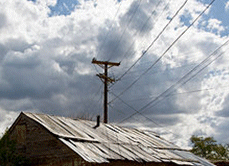
Mixamatosis was introduced to eradicate the rabbit
population with devastating consequences. The
disease caused horrible swelling in the head and
eyes of these animals and they wandered stupidly
to their death, sometimes killed in their hundreds
on the road way. We watched these pitiable
creatures with their gigantic death laden eyes
huddled in their dying thousands in every field
and country laneway.
The electricity board had delivered supplies of
pylons, stacked in groups of five or six at
strategic intervals along the road. The scorching
sun raised blisters of oozing tar from their pores.
Nineteen fifty nine forever in my mind recalls the
smell of melting tar and the feted stench of
decomposing rabbits on the road.
A new craze took hold of every boy in our area that
year. The magic of digging holes, erecting pylons,
coupled with the giddy adventure of being an
overhead linesman caught the imagination.
Everywhere on farms holes were dug, strings strung
from tree to tree and old lids and polish boxes
improvised as switches.
My mother was none too pleased when my brother and
I paused from our exertions of digging yet another
great hole and tore our vests so we could more
accurately mimic the sweating workers with their
manly chests exposed to the sun.
When at last the power was switched on we were
high with excitement and my father warned us of
the dangers of electrocution. 'It's no toy to be
tampered with', he said, as we argued which of us
should switch on the light. Eventually we took it
in turns to do so, night about, until it had lost
its novelty.
I have always been amazed at how important changes
within ourselves happen so unconsciously that we
are never aware of the small day to day
developments. Growing up, growing old, growing
tall or growing fat - these are not observed in
the gradual daily progress which is too small to
measure but in relation to other objects, people
or environments. The phenomenological reference for
my growing up pertains to that simple exercise of
putting on the light. Initially I had to stand on
a chair, later on tip-toes and later again it was
but a hand stretch away. I have much cause to
wonder at the many other changes which have
happened to me as imperceptibly but equally
dramatically as the process of growing up.
The following year the Shankill power lines were
begun. This was a new development linking two
generating stations and brought new drama to my
world.
Huge steel giants strode across the hills,
towering over the tallest trees, marching through
swamps and straddling ditches. They carried heavy
power lines that hissed and sizzled in the frost.
I had broken my wrist that year and I remember
standing outside the back of our house watching
these pylons being erected. They were planted in
a concrete base and built piece by piece until the
two great arms branched out to carry the top
section. The one in our field was nearly eighty
feet tall and it stood there begging to be
climbed. And climbed it was! My brother did it -
I only went up as far as the arms. He had a better
head for heights than me and up he went until he
was a small dark speck - ten years old and
dangling his feet from the triangular corner with
nothing beneath him but the certainty of death.
He got down safely and I have nightmares to this
day to prove it happened.
One Sunday we conquered a smaller pylon on
Trainor's Hill and my uncle bellowed from half a
mile away to 'come down ou'are that before yiz get
kilt'. His grammar was off but his concern was
genuine!
The giants are still standing and hissing at the
sky - ugly and un-magical, monuments to a blind
progress which so disfigures the beauty of the
country's face.
John B. McCabe
===========================
GAELIC PHRASES OF THE MONTH
===========================
PHRASE: Tuigim Gaeilge shimpli
PRONOUNCED: thug/imm gale/geh him/plee
MEANING: I understand simple irish
PHRASE: Nil moran Gaeilge agam.
PRONOUNCED: kneel more/on gale/geh ah/gum
MEANING: I dont have much Irish
PHRASE: De reir a cheile a thogtar na caisleain
PRONOUNCED: day rare a kayla a hug/tar nah cosh/lawn
MEANING: It takes time to build castles
==================
COMPETITION RESULT
==================
The winner was: ronald.kenny@nf.sympatico.ca
who will receive the following:
A Single Family Crest Print (decorative)
(US$19.99 value)

Send us an email to claim your print, and well done!
Remember that all subscribers to this
newsletter are automatically entered into the
competition every time.
I hope that you have enjoyed this issue.
Until next month,

Michael Green,
Editor,
The Information about Ireland Site.
https://www.ireland-information.com
Click here to contact us
